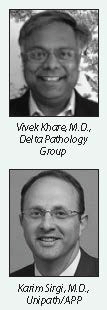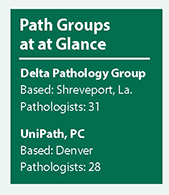To go it alone or to merge? That question, more than any other, seemed to hang over G2 Intelligence’s annual Pathology Institute.The attendees at the two-day gathering in Fort Lauderdale, Fla., Feb. 28-March 1 seemed palpably anxious about the future of their practices, particularly whether they could tough out recent deep cuts in reimbursement as the result of the Centers for Medicare and Medicaid Services’ changes to payment for CPT code 88305, the recently imposed reimbursement cuts from budget sequestration, and the implementation of most provisions of the Affordable Care Act starting in early 2014.
Moreover, industry observers suggested that the financial turmoil in the lab industry has depressed the value of pathology practices, meaning that selling out is no longer a straight shot to long-term financial security and independence.
A joint session by two pathology executives provided some answers as to what courses could be taken toward finding firmer traction—whether or not a practice decides to go it alone or find a new partner.
Vivek Khare, M.D., business manager for the Delta Pathology Group in Shreveport, La., discussed options for those colleagues wishing to maintain independence. Karim Sirgi, M.D., president of UniPath/APP, in Denver, discussed the kind of merger that can take place if the practitioners keep as focused on their own independence as they do on the bottom line.
Both are midsized practices. UniPath has 28 pathologist, and Delta has 31.
Surmounting Louisiana’s Market Challenges
Delta itself was founded 15 years ago through the merger of three Shreveport-area pathology practices. But consolidation within the Bayou State is not simple—it took five years for Delta to stabilize after the merger was consummated.
According to Khare, Louisiana is challenged by both demographics and geography. Forty percent of its population is located in rural regions with a high concentration of Medicaid patients.
“The presence of this high-cost, low-reimbursement market forces practices to consolidate but makes that consolidation very challenging,” he said.
A SWOT analysis (strengths, weaknesses, opportunities, and threats) undertaken a decade ago concluded that while Delta had access to most of the providers in the Shreveport area, it fell short in terms of clinical, genetic, and molecular testing capabilities. Management also felt that Delta needed to have statewide reach to reflect overall consolidation of businesses with the health care sector. Delta leaders decided to position the path lab as a homegrown alternative to national and out-of-state labs. The expansion was undertaken without incurring debt or taking on an outside partner.
Delta decided to segment its services. Delta Pathology focuses on anatomic and molecular pathology. It performs about 990,000 billable tests a year, along with 195,000 accessions. An affiliate company known as Omega Diagnostics, founded in 2005, focuses on clinical pathology and markets the hospital side of the business. It performs about 1.4 million billable tests annually.
A third segment, Pathology Resource Network, provides services such as courier work, audits, accounts payable, CLIA compliance consultation, logistics, information technology (IT), and lab consolidation. Those services led to the purchase of two labs in Louisiana that Khare described as being “in crisis” regarding their ability maintain CLIA compliance.
As a result of its diversification, Delta now has attained much of that statewide reach, including a strong presence in New Orleans, and is now Louisiana’s second-largest Medicaid lab. Revenue has tripled over the last decade. Net income has increased by about 75 percent.
But not all is rosy. Delta is still fending off incursions by outside labs, including a move by an unnamed national player that took 7,000 Pap smear tests a year from Delta. Another 4,500 accessions were lost due to the ongoing economic downturn and the growth of insurance policies with high patient deductibles.
At a Crossroads
“We decided to take a slightly different turn,” Sirgi from UniPath observed.
In some ways, UniPath had an ancestry similar to Delta’s, with its formation traced to the successful merging of three pathology groups—two with a hospital-based business, and one more dependent on outpatient work.
And UniPath was also facing similar market pressures: By 2007, it faced an increased need for subspecialization, reimbursement risks, increased in-sourcing pressures, and the need to invest in expensive pieces of equipment to improve its molecular capabilities, IT, and overall work flow.
At the same time, UniPath’s position as the dominant lab in the Denver region had put it on the radar for bigger players, primarily regional and national organizations.
“When people come to you with business propositions, it is never not tempting to listen to them. You always want to listen to them,” Sirgi said. As a result, UniPath’s leaders took meetings with a variety of interested parties.
However, Sirgi and his colleagues always returned to a familiar worry: Making a too-hasty decision that could impact the quality of UniPath’s work—and patient care—down the line.
In other words, the perfect long-term solution for UniPath would allow it access to financing for maintaining its infrasucture and other needs required for further growth, without ceding control.
“We were at a crossroads. Business is not static, business was dynamic, and we wanted to take it to the next level,” Sirgi said.
Then American Pathology Partners (APP) came seemingly “out of nowhere” as Sirgi described it—a Nashville, Tenn.-based organization that has fused a variety of practices into a nationwide network of pathology practices while allowing their practitioners a high level of independence.
Although APP received an initial funding commitment of $75 million from the venture capital firm New Enterprise Associates six years ago, it was still a startup. No one within UniPath had heard of the organization.
“We got a phone call from them and thought it was a hoax,” Sirgi said.
Marriage of Reason
But as talks commenced and then progressed, it became clear to UniPath that APP was offering what Sirgi termed a “marriage of reason.” APP was committed to growing the practice—and compensating the pathologists accordingly—while at the same time not interfering with how they operated.
UniPath closed a deal with APP in late 2008, making the group its first acquisition. It was agreed most governance matters would be conducted via a joint strategy board with equal representation from both parties.
Despite the unfolding of the economic crisis, UniPath’s pathologists received everything they wanted, including a commitment from APP to provide UniPath a brand new molecular lab. The $1.4 million facility opened in 2010. It also upgraded its existing flow cytometry capabilities and IT. The pathology assistant and grossing staff was doubled from seven employees to 14.
The sales and marketing team also expanded from four employees to 21. That was not only enough to grow the business organically but also to neutralize threats from competitors, Sirgi noted.
UniPath has grown significantly in the intervening years. Its pathology staff has expanded by a third, to 28 in total, and it has added service lines such as renal and gastrointestinal pathology. In 2012, net income grew by 17 percent.
But, like Delta, challenges remain for UniPath. Sirgi said that a business model predicated on continued volume growth may not be sustaining in the long run, and asked the rhetorical question many principals involved in a merger ask: How long will I remain individually relevant to the larger organization?
“A business transaction is like a marriage . . . you need to find the right partner,” Sirgi said. And it appears to UniPath’s management that they succeeded in doing so.
“Would we do it again? Absolutely, yes,” Sirgi said. “We have challenges, but they are good challenges. And we are still alive as a business.”
Associated Data



